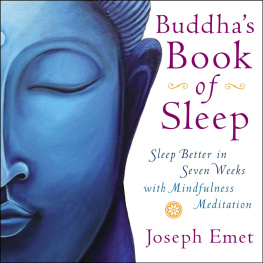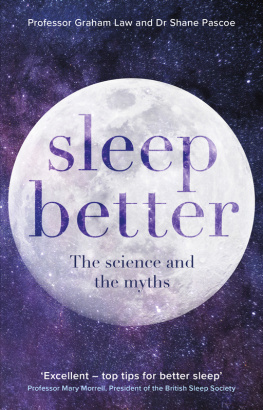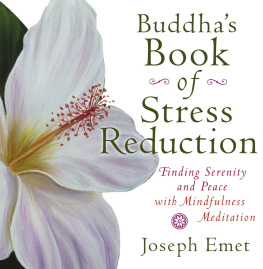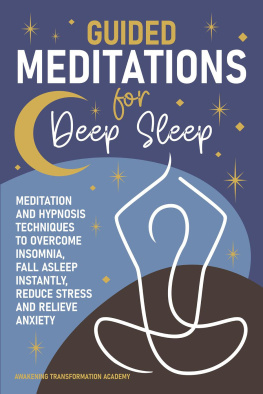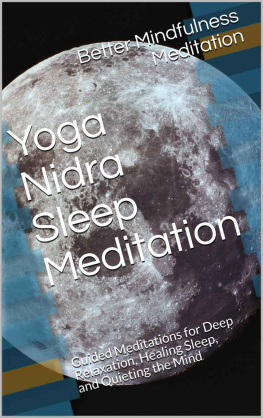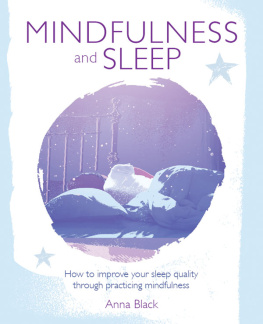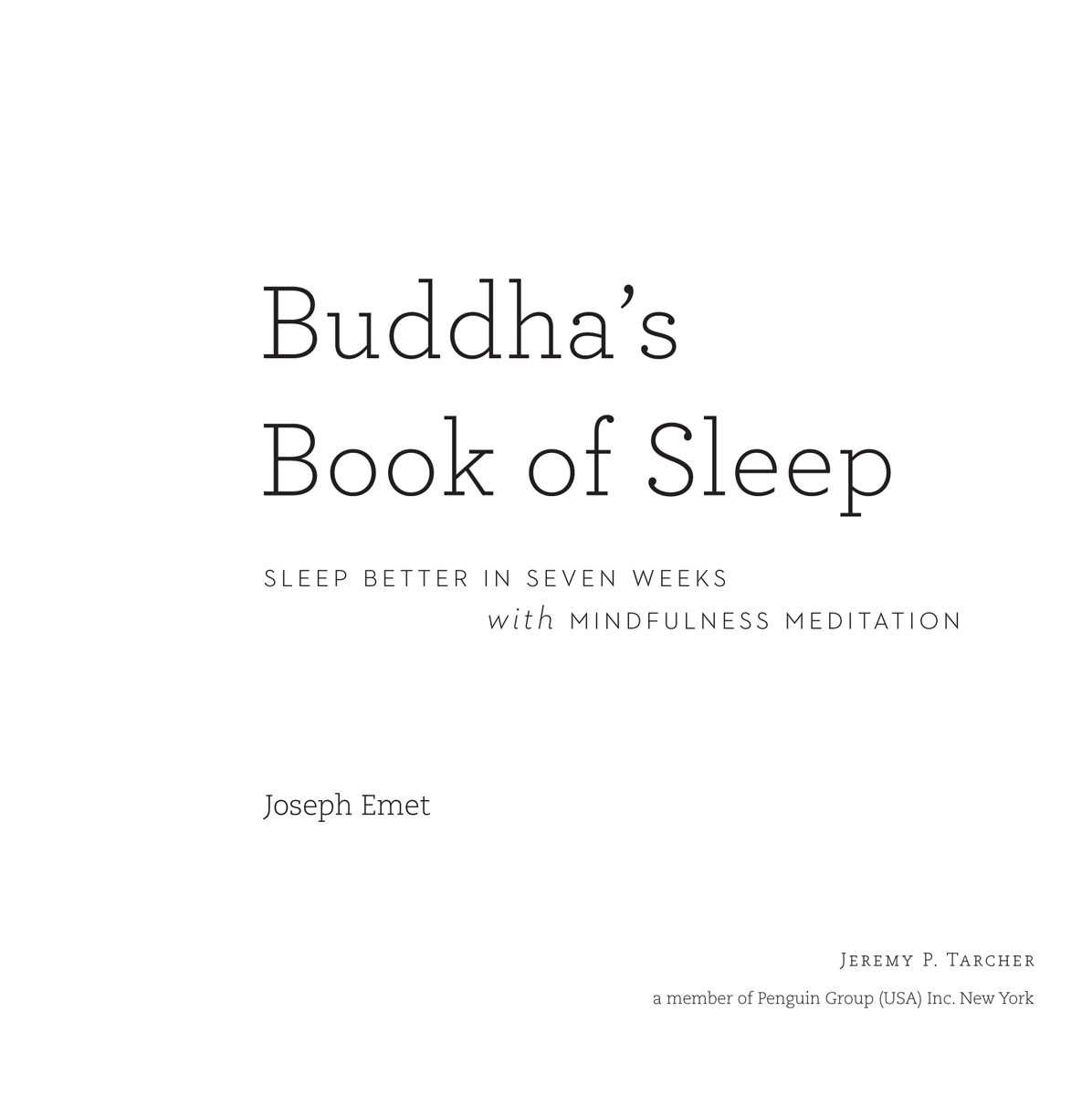JEREMY P. TARCHER/PENGUIN
Published by the Penguin Group
Penguin Group (USA) Inc., 375 Hudson Street, New York, New York 10014, USA Penguin Group (Canada), 90 Eglinton Avenue East, Suite 700, Toronto, Ontario M4P 2Y3, Canada (a division of Pearson Penguin Canada Inc.) Penguin Books Ltd, 80 Strand, London WC2R 0RL, England Penguin Ireland, 25 St Stephens Green, Dublin 2, Ireland (a division of Penguin Books Ltd) Penguin Group (Australia), 707 Collins Street, Melbourne, Victoria 3008, Australia (a division of Pearson Australia Group Pty Ltd) Penguin Books India Pvt Ltd, 11 Community Centre, Panchsheel Park, New Delhi110 017, India Penguin Group (NZ), 67 Apollo Drive, Rosedale, Auckland 0632, New Zealand (a division of Pearson New Zealand Ltd) Penguin Books (South Africa), Rosebank Office Park, 181 Jan Smuts Avenue, Parktown North 2193, South Africa Penguin China, B7 Jiaming Center, 27 East Third Ring Road North, Chaoyang District, Beijing 100020, China
Penguin Books Ltd, Registered Offices: 80 Strand, London WC2R 0RL, England
Copyright 2012 by Joseph Emet
All rights reserved. No part of this book may be reproduced, scanned, or distributed in any printed or electronic form without permission. Please do not participate in or encourage piracy of copyrighted materials in violation of the authors rights.
Purchase only authorized editions. Published simultaneously in Canada
Most Tarcher/Penguin books are available at special quantity discounts for bulk purchase for sales promotions, premiums, fund-raising, and educational needs. Special books or book excerpts also can be created to fit specific needs. For details, write Penguin Group (USA) Inc. Special Markets, 375 Hudson Street, New York, NY 10014.
Neither the publisher nor the author is engaged in rendering professional advice or services to the individual reader. The ideas, procedures, and suggestions contained in this book are not intended as a substitute for consulting with your physician. All matters regarding your health require medical supervision. Neither the author nor the publisher shall be liable or responsible for any loss or damage allegedly arising from any information or suggestion in this book.
ISBN 978-1-101-60387-1
To
Thich Nhat Hanh with gratitude.
I remember:
Happiness is not built of bricks and stones, let us sing with the flower and the morning birds.
Childrens castles, lovers footprints
the agony of drying starfish
all gone
as the surf wipes clean the beach
with fresh waves coming from the vastness of the ocean.
Let the breath wipe away yesterdays words
this mornings thoughts
and the tightness that remains of them
until there is only this moments freshness.
J. E.
Contents
PART ONE
Mindfulness Meditation Training and Its Relevance for Better Sleep
PART TWO
Guided Meditation ExercisesSeven Weeks Toward Mastering Mindfulness Meditation
Foreword
I imagine that the Buddha slept peacefully, without anxiety and without worry. I think that he was peaceful in heart and mind, not only during his waking hours, but also when he lay down to sleep. The key to peaceful sleep is a peaceful mind, and the Buddha had a peaceful mind.
Knowing how to rest is an art. Without mindfulness, our propensity to be in the future instead of in the present, our habit of constantly being in our thoughts and constantly thinking about our projects, can make us exhausted. It can interfere with our ability to sleep. We can easily lose the proper balance between activity and rest.
The practice of mindfulness meditation can help to bring peace to our hearts and minds. It can alleviate stress. It can help us to slow down in order to enjoy each moment of our lives. And it can calm an agitated mind. As you read this book and do the guided meditation exercises in it, you may experience many moments of insight into the causes of your sleep difficulties. You may also learn how to relax, and improve your sleep.
Thich Nhat Hanh
Plum Village, France
Preface
Consider the following statements:
I know I shouldnt think about work once Im in bed, but I do, and I get all worked up.
I know I should not get so angry with my children, but I cant help it.
I know I should not get second helpings at dinner, but I do, and I keep gaining weight.
I know I should not smoke, but I continue to do it.
I know I shouldnt let little things get to me, but I think about them when Im in bed, and it keeps me awake.
Do any of these sound familiar? The I in these situations is the conscious mind. The conscious mind knows, but is unable to pass its knowledge on to the unconscious mind so that it can become second nature. Mindfulness Meditation Training (MMT) gives us the tools to pass on the knowledge of the conscious mind to the unconscious mind.
Regrets, worries, anger, and food cravings sneak up on us. With some MMT under our belt, we can see them coming. When they knock on the door, we do not have to let them in. MMT does not make us perfect. It makes it easier to live with our imperfections. After the training, you may still feel cravings. But you are no longer a slave to your cravings. When you get into bed at night, you may still feel thoughts of all kinds trying to get into your mind. But now you have enough awareness to see them coming, and enough freedom to say, Not now, thank you.
This may sound too good to be true. Yet countless people have been helped by mindfulness meditation training to lower their stress levels, improve their relationships, and overcome personal difficulties. This book applies similar successful techniques to achieving better sleep.
PART ONE
Mindfulness Meditation Training and Its Relevance for Better Sleep
Introduction
I can hear you chuckling as you read the title of this book. Youre probably thinking Isnt Buddha better known for promoting awakening rather than sleeping?
Yes... but the word awakening is used by Buddhists in a metaphoric sense, and used that way, it means awareness. For example, one may say that we seem to be asleep to the fact that we are damaging the environment with our way of life, and that we need to awaken. (In fact, we do need a rude awakening in that area.) As metaphor, asleep means unconscious or unaware. But the reality of sleep is different; it is a basic need like food and water, and it is the reality of sleep that this book addresses. In that sense, sleeping and awakening are not incompatible. Buddha was not promoting insomnia. On the contrary; he was promoting release from suffering, and insomnia is a form of suffering. As you do the exercises in the second part of the book, you will

